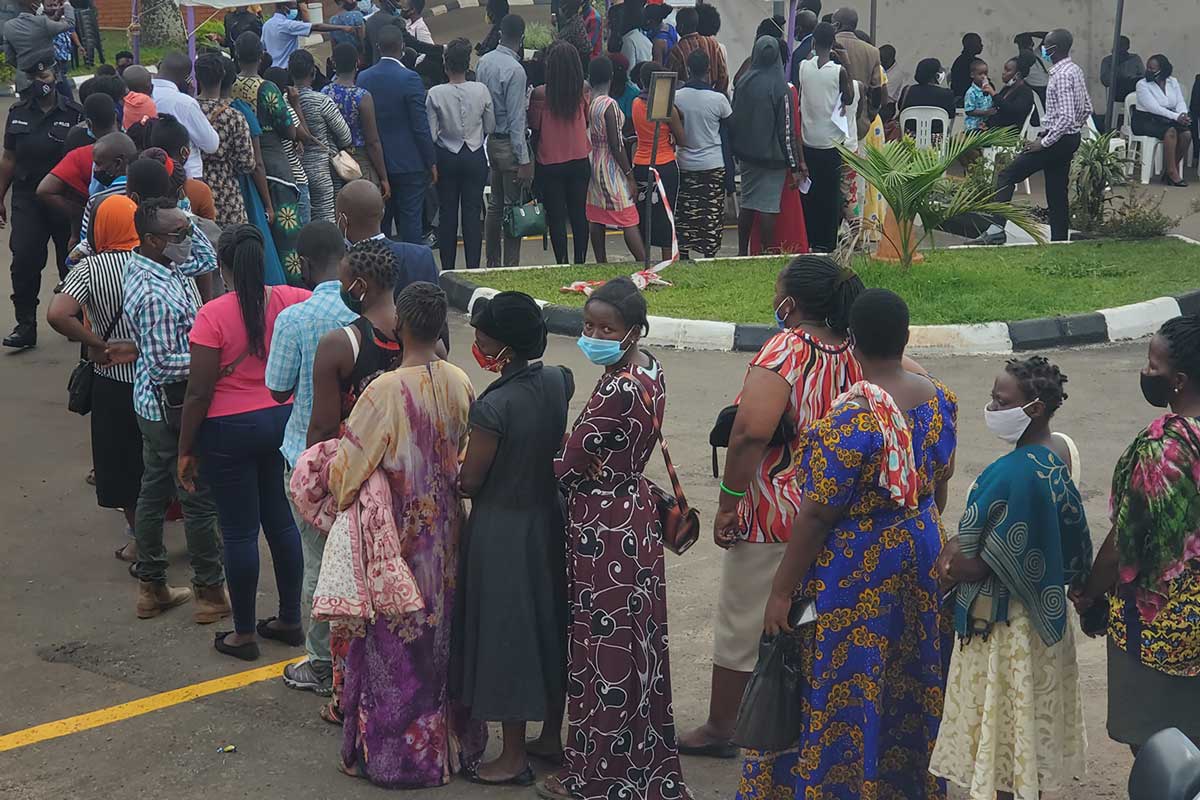Refugees included in Uganda’s COVID-19 vaccine drive
Uganda is setting an example by including its estimated 1.4 million refugees in its COVID-19 vaccine programme, however there are still barriers to overcome.
- 3 August 2021
- 4 min read
- by Evelyn Lirri

Uganda is home to an estimated 1.4 million refugees and asylum seekers, mostly from South Sudan, Democratic Republic of Congo (DRC), Burundi, Rwanda and Somalia. About 93,000 of these refugees live in the capital Kampala, while the rest are spread across mostly border districts of the country
Under Uganda’s open-door, globally-lauded refugee policy, refugees benefit from the same public services as their host communities, including education and healthcare. They are also allowed to work, move freely and set up businesses.
Amudu, who has received the vaccine, explains that much of the uncertainty about how refugees can access COVID-19 vaccines has stemmed from misinformation, disinformation and language barriers.
Dr Jane Ruth Aceng, the Minister of Health says refugees, like all other citizens, are eligible to be vaccinated. “Our estimates for vaccines covered refugees and there is no refugee who will be turned away when they show up at any public health facility,” says Dr Aceng.
While COVAX has set up a specific mechanism – the COVAX Humanitarian Buffer – to get COVID-19 vaccines to people in conflict zones and humanitarian settings that otherwise wouldn’t receive vaccines from their governments, countries with refugee populations are encouraged to include them in their vaccine plans.
The challenge now is to both ensure that refugees are aware of the vaccines on offer to them, and that local health workers know they are eligible.

Photo by Evelyn Lirri
When Jean Mwene, a Rwandan refugee, learned that Uganda had started vaccinating against COVID-19 in March 2020, he quickly sought to get the jab at one of the public health centres in the capital, Kampala.
“When I got there, I was told that they were only vaccinating those with identity cards. When I produced my refugee card they said the vaccine was only for Ugandan citizens,” says Mwene.
Have you read?
Mwene does acknowledge that some of his fellow refugees have gone to the same health centres and received the vaccine, like 55-year-old Joyce Makeba, a refugee from DRC who has lived in Uganda for the past 13 years.
Jean Pierre Amudu, a refugee community leader and organiser says that after receiving complaints from some refugees who have been turned away, they have visited health facilities that are often frequented by refugees to understand why this is the case.
“When we went to speak to the health workers, we realised some are just ignorant of the policy. The refugees can actually access the vaccines,” says Amudu, who hails from the DRC and has been living in Uganda since 2012.
Amudu, who has received the vaccine, explains that much of the uncertainty about how refugees can access COVID-19 vaccines has stemmed from misinformation and language barriers.
“Most refugees have no access to information,” he says. “Others are getting the information from fellow refugees and sometimes it is not accurate. So, we hold public discussions with them on the importance of being vaccinated. We also show them videos and photos of those who have already been vaccinated to build their confidence.”
“But most of the communication on vaccination that we see in the media is conducted in English or Luganda [the predominant local language spoken within Kampala], yet most refugees are illiterate. They need translations for these messages.”
Indeed, a recent study by Makerere University researcher, Dr Gloria Seruwangi, titled Refugee Lived Experiences, Compliance and Thinking (REFLECT) that assessed the knowledge of refugees on the COVID-19 Standard Operating Procedures (SOPs), found that there were knowledge gaps and language barriers.
“Exclusion of refugees is believed to be the key explanatory factor for why they are among the most vulnerable to the COVID-19 pandemic. In order to ensure refugees’ inclusivity, government and other stakeholders should ensure COVID-19 messages are translated to refugee languages,” the report notes.
“Setting up a system where refugees go to specific public facilities where there is an interpreter to explain the vaccine and possible side effects would increase access,” says Amudu.
More from Evelyn Lirri
Recommended for you








